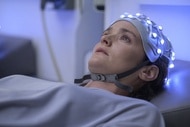Create a free profile to get unlimited access to exclusive videos, sweepstakes, and more!
Paleontologists have discovered a theropod fossil sitting on a clutch of eggs

Representing one of the most remarkable discoveries in decades, a team of Chinese paleontologists have identified what is considered to be the very first non-avialan dinosaur fossil capturing an oviraptorid theropod sitting on an egg clutch that housed embryonic remains.
Unearthed from the Upper Cretaceous Nanxiong Formation in proximity to the Ganzhou railway station in the Jiangxi Province of China, the 70-million-year-old partial skeleton of an adult oviraptorid theropod was frozen in time atop a preserved nest of 24 or more eggs, many of which were cracked open and revealed embryonic bones.
“Dinosaurs preserved on their nests are rare, and so are fossil embryos,” said Dr. Shundong Bi, a paleontologist in the Centre for Vertebrate Evolutionary Biology at the Yunnan University’s Institute of Palaeontology and the Department of Biology at the Indiana University of Pennsylvania. “This is the first time a non-avian dinosaur has been found, sitting on a nest of eggs that preserve embryos, in a single spectacular specimen.”
According to the study published in Science Bulletin, the pile of dino eggs measure 21.5 cm in length and 8.5 cm in width along equatorial regions. External surfaces show ornamentation comprised of thin, densely packed ridges roughly 2-3 mm in width. Exposed embryonic material was seen in seven eggs, but actual ossified bones with recognizable morphologies were witnessed in only four eggs.
“This kind of discovery, in essence fossilized behavior, is the rarest of the rare in dinosaurs,” notes Dr. Matthew Lamanna, a researcher with the Section of Vertebrate Paleontology at the Carnegie Museum of Natural History. “Though a few adult oviraptorids have been found on nests of their eggs before, no embryos have ever been found inside those eggs.”
“In the new specimen, the babies were almost ready to hatch, which tells us beyond a doubt that this oviraptorid had tended its nest for quite a long time. This dinosaur was a caring parent that ultimately gave its life while nurturing its young.”
Scientists learned that each embryo seemed to be well-developed, and a number of them indicated more advanced maturity than others, which suggests that the oviraptorid eggs could have hatched at unbalanced times in a process called asynchronous hatching.
Adding to the rarity of the find, a cluster of stomach stones known as gastroliths were also found in its abdominal cavity. This represents the first instance that gastroliths have been discovered in an oviraptorid and this new data could add new understandings of the creature's diet.
“It’s extraordinary to think how much biological information is captured in just this single fossil,” said Dr. Xing Xu, co-author and researcher at the Institute of Vertebrate Paleontology and Paleoanthropology at the Chinese Academy of Sciences. “We’re going to be learning from this specimen for many years to come.”




























